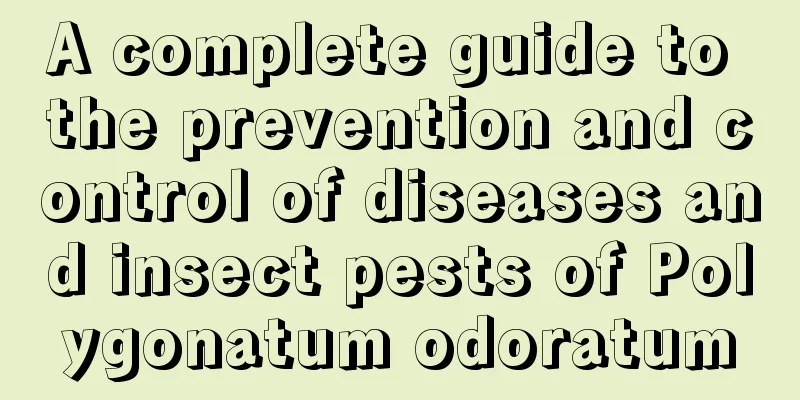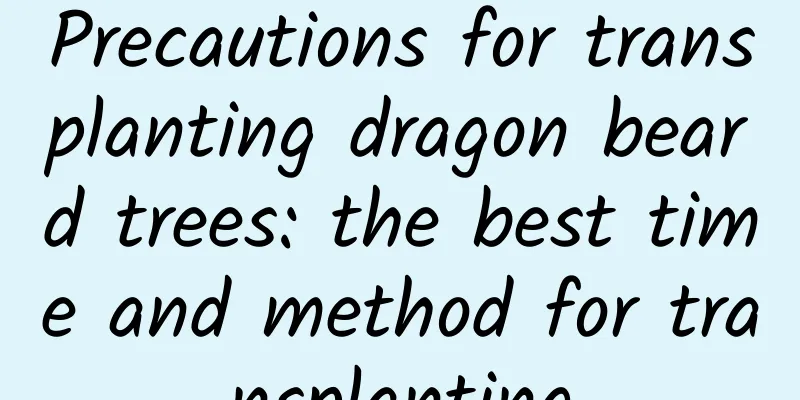A complete guide to the prevention and control of diseases and insect pests of Polygonatum odoratum

Main diseases and insect pests of Polygonatum odoratumThe main diseases and pests of Polygonatum odoratum include leaf spot disease (yellowing and withering of leaves), root rot (root rot), gray spot disease (leaf death), purple ring disease (gray-brown lesions on leaves), etc. Next, the editor will explain in detail the causes and prevention methods of these diseases and pests! Leaf spotSymptoms of Leaf SpotLeaf spot is a fungal disease that affects the leaves of Polygonatum odoratum: it causes oval or irregular shapes to appear at the tip of the leaves, purple-red edges, and brown spots to appear in the middle, eventually causing the leaves to wither and die. This condition often occurs in summer and autumn, with a higher incidence rate during the rainy season. Leaf spot controlPay attention to maintaining a clean planting environment. Diseased leaves and dead branches need to be burned in a centralized manner to eliminate overwintering pathogens. In the early stage of leaf spot disease, Bordeaux mixture can be used for sterilization in a ratio of 1:1:120. Or use a 1000 times solution of thiophanate-methyl (50%), spray once every 10 days, and continue for 2-3 times. Root rotRoot Rot SymptomsThe root rot of Polygonatum odoratum is mainly manifested in the appearance of light brown circular lesions on the rhizomes, which gradually rot, seriously affecting the output quality of Polygonatum odoratum and the subsequent transplanting and planting. The main cause is that it is caused by pathogens (a type of Fusarium), which will overwinter in the soil and infect the roots. It is a very common disease and pest of Polygonatum! Root rot prevention and treatmentUse drugs to irrigate the roots at the early stage of the disease: It is recommended to use a 500-fold solution of carbendazim (50%) to sterilize the roots. For Polygonatum odoratum that is already "terminally ill", it is recommended to remove it ruthlessly and disinfect the soil thoroughly with chemicals... Gray spotSymptoms of gray spotSimilar to leaf spot, it is also a bacterial disease. In the early stage of the disease, circular (purple edges and gray center) lesions will form on the surface of the leaves of Polygonatum odoratum. Stripe-like spots will also form on the leaf veins, which can cause leaf death in severe cases. This disease is more common in summer, with the highest incidence in June and July. Gray spot disease prevention and control methodsUse 500 times dilution of Benomyl for sterilization, spray every 6-7 days, and continue for about 3 times. Purple wheel diseaseSymptoms of purple wheel diseasePolygonatum odoratum purple ring disease is a type of leaf disease, with oval spots appearing on both sides of the leaves, with a diameter of 2-5 cm. The initial lesions are red and gradually turn into gray-brown. It is a disease caused by fungi (Ascomycota, genus Macroplastid), which is dormant in winter and spreads through air currents as the temperature rises. The common disease period is June-July. Purple wheel disease prevention and treatment methodsMaintain good sanitation in the planting environment. If diseased leaves are found in the early stage, they must be removed in time. After the plants die, they must be thoroughly cleaned and disposed of in a centralized manner (burned or buried deep). |
<<: Disease prevention and control of Parthenocissus tricuspidata
>>: Prevention and control of common diseases of Amaryllis
Recommend
Taboos on placing a fortune tree, where is the best place to put it
1. Taboos of placement 1. Do not place the money ...
When is the best time to prune the weeping crabapple
Pruning effect of weeping begonia The weeping sil...
What should I do if my domestic azalea wilts?
1. Replace the loam If the soil becomes too alkal...
Tuberose pictures
Introduction to Tuberose The branches of tuberose...
How to plant black rice
Planting method Seedling cultivation First of all...
How to prune roses
1. Prune the remaining flowers After the flowerin...
Ganoderma lucidum growth environment conditions and characteristics
Ganoderma lucidum growth environment conditions a...
Do plum trees prefer shade or sun?
Do plum trees prefer shade or sun? The plum tree ...
The efficacy and function of butterfly flower
1. Chinese herbal medicine Butterfly flower is a ...
The efficacy and function of litchi
effect The sweet lychee has a relatively warm nat...
How to fertilize Rieger Begonia
1. Fertilization method 1. Seedling stage: This p...
Where do carrot seeds come from?
How do carrot seeds come from? Carrot seeds grow ...
Is it poisonous to place evergreen indoors?
1. Is it poisonous? The sap in the leaves and ste...
What kind of crop is sorghum?
What kind of crop is sorghum Sorghum is a herbace...
Management technology of yellow pear
Rhubarb pear is a kind of pear that many people l...









